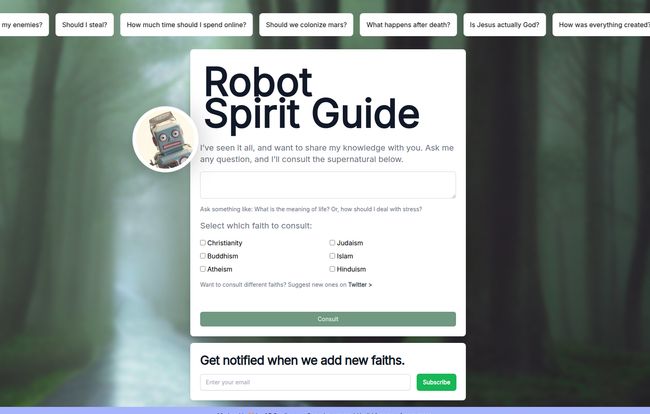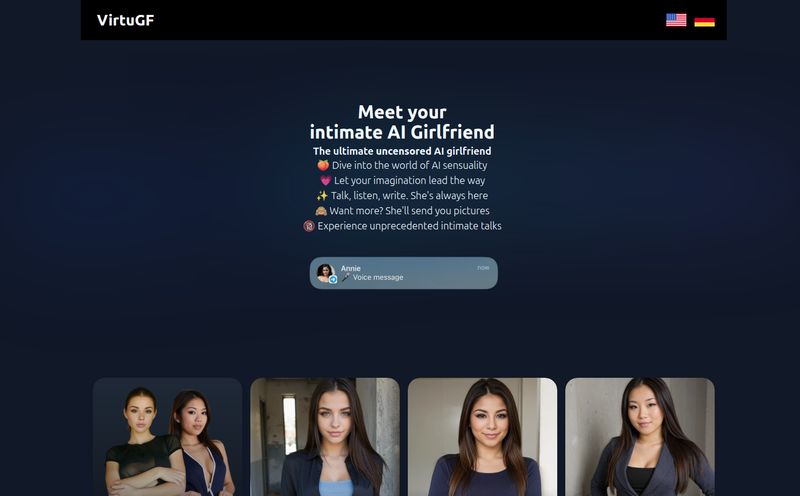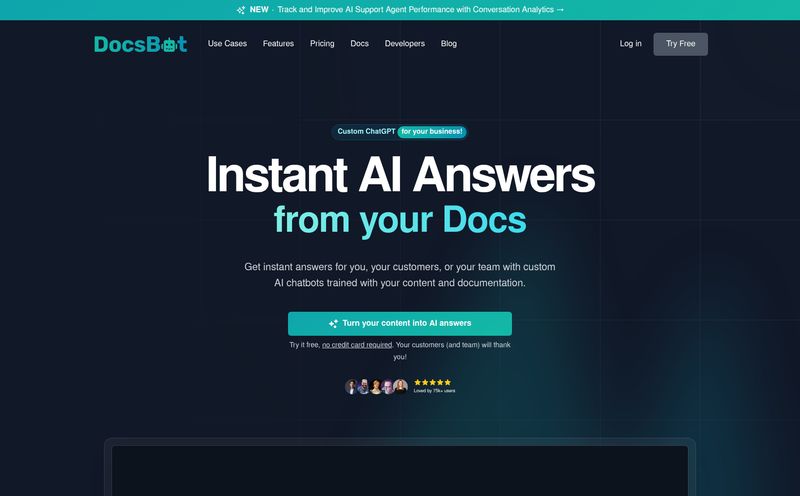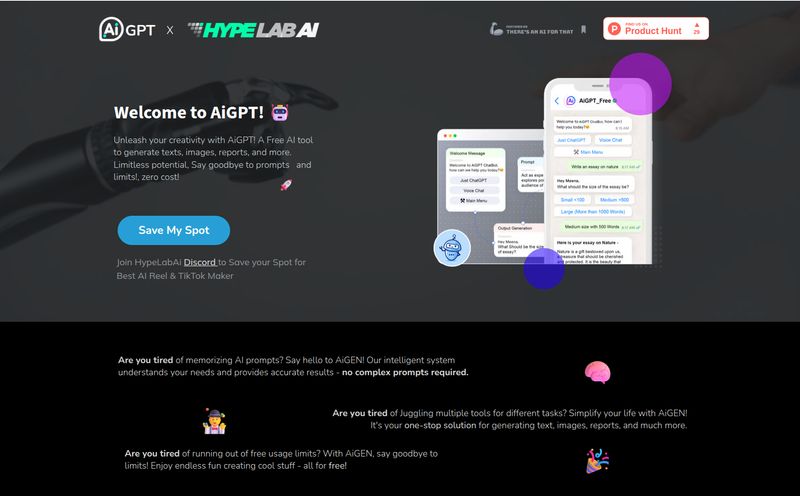We’ve all been there. It’s 2 AM, the world is quiet, and your brain decides to hit you with a question like, “What’s the actual point of all this?” or “Should I quit my job and become a beekeeper?” So what do you do? You turn to the modern oracle: Google. And you’re met with a firehose of conflicting advice, angry forum posts, and listicles that don't really help.
It’s a uniquely modern kind of existential dread. We have access to all the information in the world, yet wisdom feels farther away than ever.
So, when I stumbled upon something called Robot Spirit Guide, I was immediately intrigued. The landing page shows a quaint little retro robot against a serene forest backdrop, promising to “consult the supernatural” for me. An AI for my soul-searching? In an era where AI is writing code, making art, and generally creeping into every corner of our lives, I suppose this was inevitable. But is it any good? Or is it just a gimmick? I had to find out.
What Exactly is Robot Spirit Guide?
At its core, Robot Spirit Guide is a surprisingly simple and elegant tool. It was built by the clever folks over at AE Studio, and it uses OpenAI's GPT-3 model—the brain behind many of the AI tools you're hearing about—to answer your questions from the perspective of various world faiths.
You type in a question, any question at all. It can be something profound like “What happens after we die?” or something more mundane like, “Is it okay to gossip about my coworkers?” Then, you just tick the boxes for the belief systems you want to hear from. The current roster includes:
- Christianity
- Judaism
- Buddhism
- Islam
- Hinduism
- Atheism
I found the inclusion of Atheism to be a particularly smart move. It grounds the tool and shows it’s more about exploring diverse philosophical frameworks than pushing a specific doctrine. After you select your faiths, you hit “Consult,” and the robot gets to work.

Visit Robot Spirit Guide
My First Consultation with the Robot Guru
For my first test, I decided to go with a question that plagues pretty much everyone in our line of work: “How much time should I spend online?” It feels both modern and deeply philosophical. I checked all the boxes. I wanted the full spectrum of spiritual advice on my screen time.
The answers that came back were… fascinating. It felt less like a single AI and more like a panel of scholars had been convened in my browser.
The Buddhist perspective, as you might expect, talked about mindfulness and the present moment. It suggested that time online is problematic when it becomes a source of attachment and distraction from the real world. The Christian viewpoint brought up concepts of stewardship—using your God-given time wisely and avoiding the 'idols' of modern life, like endless scrolling. The Atheist take was pragmatic, focusing on the measurable impact on mental health, productivity, and the importance of real-world human connection for our well-being. It was like getting six different advisors in 30 seconds.
The Good, The Bad, and The AI
After playing with the tool for a good hour (the irony is not lost on me), I started to form some strong opinions. There’s a lot to like here, but you definately need to approach it with the right mindset.
A Fantastic Starting Point for Exploration
The biggest win for Robot Spirit Guide is its accessibility. If you've ever been curious about what Islam teaches about charity, or what a Hindu perspective on environmentalism might be, you’d typically have to do some serious digging. You’d be wading through dense texts, academic papers, and websites of varying quality.
This tool is like a philosophical sampler platter. It gives you a quick, digestible taste of multiple viewpoints side-by-side. It’s an incredible starting point that can spark genuine curiosity and point you toward deeper, more meaningful research. The user interface is clean, fast, and there are no barriers to entry. It’s a frictionless path to broadening your horizons.
But Don't Fire Your Rabbi Just Yet
Now for the reality check. As an SEO who’s been watching the rise of AI content, I know the limitations of large language models like GPT-3. This AI isn't thinking or believing. It's a hyper-advanced pattern-matching machine. It has ingested a colossal amount of text from the internet and learned to predict what words should follow other words based on a given prompt. You can learn more about how it works from OpenAI themselves.
This leads to the tool’s main weakness: a lack of nuance. Religion is more than just a collection of doctrines; it's steeped in millennia of culture, tradition, interpretation, and heated debate. When the tool gives you the “Christian” perspective, whose is it? A progressive Methodist’s? A Coptic Orthodox monk’s? A Southern Baptist preacher's? The AI will likely generate a kind of “average” or generalized response that sands down all the interesting, complex, and often contradictory edges. It gives you the Wikipedia summary, not the lived, breathed, and argued-over faith.
Who Is This Tool Really For?
So, who should be using this? In my opinion, the ideal user is the “spiritually curious.” It’s for the person who wants to understand their neighbor's beliefs a little better, or who wants to challenge their own assumptions by seeing how another worldview tackles a problem. It’s a phenomenal tool for generating empathy and perspective.
I could also see it being a godsend (pun intended) for students in a comparative religion or ethics class. It’s a great way to quickly compare and contrast different approaches to a specific issue for a paper or a debate.
Who is it not for? Someone in a deep personal crisis looking for a single, authoritative answer. This is a tool for exploration, not a source of definitive truth. It’s a compass that shows you all the possible directions, not a GPS that gives you turn-by-turn instructions.
The Bigger Picture of AI and Spirituality
Tools like Robot Spirit Guide make me wonder about the future intersection of technology and our inner lives. We already have meditation apps and digital therapy. It’s not a huge leap to imagine more advanced AI spiritual advisors. But it raises some thorny questions. Are we at risk of outsourcing our own introspection? Does turning to a bot for wisdom cheapen the process of wrestling with life's big questions ourselves?
I don't have the answers. But I think it’s a conversation we need to start having. For now, I see Robot Spirit Guide as a positive development—a tool that uses technology to foster understanding rather than division.
What About the Price Tag?
Here’s the best part. As of this writing, Robot Spirit Guide is completely free to use. There's no pricing page, no subscription, no hidden fees. It seems to be a project from AE Studio to showcase their skills, and what a fantastic showcase it is. There’s a small box to subscribe for notifications when new faiths are added, which I immediately did.
Final Thoughts on the Robot Spirit Guide
So, is it a gimmick? No, I don't think so. It's more than a novelty. Is it a replacement for a theologian, a spiritual mentor, or years of study? Absolutely not, and it doesn't pretend to be.
Robot Spirit Guide is a clever, well-executed, and thought-provoking tool that sits in a fascinating middle ground. It's a digital Ouija board for the philosophically curious. It won’t give you winning lottery numbers or the one true meaning of life, but it will give you something almost as valuable: perspective.
Would I use it again? For sure. Next time I'm pondering whether we should colonize Mars, I’m genuinely curious to see what a robot thinks Buddha would have said about it. And that, in itself, is pretty cool.
Your Questions Answered
- Is Robot Spirit Guide free to use?
- Yes, currently the tool is completely free to use. There are no subscriptions or fees mentioned on the site.
- What AI model does Robot Spirit Guide use?
- It is powered by OpenAI's GPT-3, one of the most advanced large language models publicly available.
- Can the AI's answers be trusted as completely accurate?
- No. The answers should be seen as AI-generated interpretations based on vast amounts of text data. They are a great starting point but can lack the deep nuance and context of human religious scholarship and may contain biases from the training data. Always cross-reference with authoritative sources.
- What religions or belief systems are included?
- Currently, the tool supports Christianity, Judaism, Buddhism, Islam, Hinduism, and Atheism.
- Who created the Robot Spirit Guide tool?
- The tool was created by the team at AE Studio, a development and data science consultancy.
- How can I suggest a new faith to be added?
- On the website, there's a link next to the faith selection that says “Suggest new ones on Twitter.” You can also subscribe with your email to get notified when new faiths are added in the future.
Give the Robot Spirit Guide a try for yourself, but go in with an open and curious mind. Treat it like a conversation with a very, very well-read new friend. It’s a fascinating glimpse into how different belief systems approach the same core human questions, and in a world that could always use a bit more understanding, that’s a valuable thing indeed.
Reference and Sources
- Robot Spirit Guide Tool: https://robotspiritguide.com/
- Creator's Website: https://ae.studio/
- About GPT-3: https://openai.com/gpt-3/
- Stanford Encyclopedia of Philosophy (for deeper reading): https://plato.stanford.edu/



